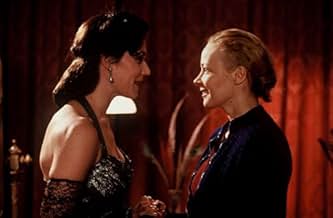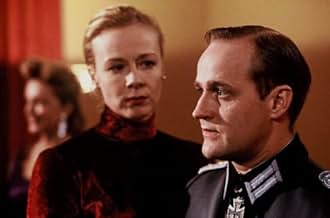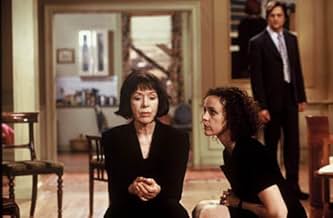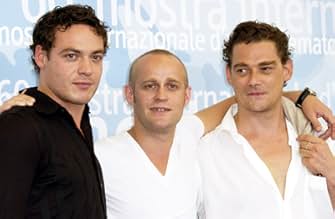AVALIAÇÃO DA IMDb
6,7/10
2,6 mil
SUA AVALIAÇÃO
Adicionar um enredo no seu idiomaAfter the death of her father, Hannah becomes concerned with the strange behavior of her mother. As her mother's troubled childhood is revealed, Hannah realizes how little she ever knew.After the death of her father, Hannah becomes concerned with the strange behavior of her mother. As her mother's troubled childhood is revealed, Hannah realizes how little she ever knew.After the death of her father, Hannah becomes concerned with the strange behavior of her mother. As her mother's troubled childhood is revealed, Hannah realizes how little she ever knew.
- Direção
- Roteiristas
- Artistas
- Prêmios
- 9 vitórias e 3 indicações no total
- Direção
- Roteiristas
- Elenco e equipe completos
- Produção, bilheteria e muito mais no IMDbPro
Avaliações em destaque
I went to see the movie for two reasons: 1) Katha Riemann was given a prize for her role in Venice and 2) The story - the rescue of hundreds of Berlin jews, who had been rounded up for deportation in the spring of 1943 - and were being kept by the Gestapo in Rosenstrasse (Rose Street) - is important. The deportation was halted by the non-jewish partners and friends who demonstrated in front of the detainment centre.
However, Trottas movie is extremely disappointing, a pamphlet put on celluloid. The movie is intended to be GOOD, the main characters are intended to be GOOD, the nazis are just EVIL, lustful or downright stupid. Maria Schrader is supposed to be a young jewish New Yorker, trying to understand the unspoken traumas of her German-born mother who survived Rosenstrasse - but never succeeds in convincing me, that she is American. (There is something about her body-language which is much too Continental). Extremely annoying is the use of German in the US scenes....spiced with a few choice english words or sentences which seem totally out of place.
Katja Riemann does add a bit more life to her character - a Preussian baroness and talented pianist, who rescues her jewish husband. (Does she really have to f*** propaganda minister Goebbels to get hubby away from Gestapo- and does Goebbels really have to be portrayed as a - cartoonish - lustful little salivating man, forever chasing a bit of tail, and so plainly disgusting).
We all know Goebbels was a war criminal - but it would have been so more interesting, if the characters were REAL people and the story not just a study in black and white with a stilted dialogue.
However, Trottas movie is extremely disappointing, a pamphlet put on celluloid. The movie is intended to be GOOD, the main characters are intended to be GOOD, the nazis are just EVIL, lustful or downright stupid. Maria Schrader is supposed to be a young jewish New Yorker, trying to understand the unspoken traumas of her German-born mother who survived Rosenstrasse - but never succeeds in convincing me, that she is American. (There is something about her body-language which is much too Continental). Extremely annoying is the use of German in the US scenes....spiced with a few choice english words or sentences which seem totally out of place.
Katja Riemann does add a bit more life to her character - a Preussian baroness and talented pianist, who rescues her jewish husband. (Does she really have to f*** propaganda minister Goebbels to get hubby away from Gestapo- and does Goebbels really have to be portrayed as a - cartoonish - lustful little salivating man, forever chasing a bit of tail, and so plainly disgusting).
We all know Goebbels was a war criminal - but it would have been so more interesting, if the characters were REAL people and the story not just a study in black and white with a stilted dialogue.
Rosenstrasse is more an intimate film than one of epic proportions, which could have kept away many film goers looking for a Pianist similar plot. Fortunately, Von Trotta, a good screenwriter, opts for a feminist peep to an era too much illustrated on its colorful exterior, but too little analyzed in terms of intimacy and from the point of view of ordinary Aryan German rather from a Jewish standpoint. Rosentrasse finds its strength in these unsung burdens of people trapped within historical circumstances of which they emerge as victims. The pace of the film is introspective, poignantly slow, meditative. Besides, the characters are so vivid while transitions between generations and the passing of time has been deftly crafted. Rosenstrasse is not a masterpiece, and some narrative flaws are well discerned. Another fault lies on a trivial cinematography unable to capture the intensity of the internal drama lived by the characters. Nevertheless, this film is worth seeing. Finally, Rosenstrasse is part of the last trend in German films dealing with the ghosts of a nightmarish past,trend that includes such excellent films as Nowhere in Africa, and recently, the controversial Downfall. I would recommend this film to those who know how to read beyond the images.
I'm always surprised about how many times you'll see something about World War 2 on the German national television. You would think they don't like to open old wounds, but there isn't a week that goes by without a documentary or a movie about the horror and atrocities of this war. Perhaps it's a way of dealing with their past, I don't know, but you sure can't blame them of ignoring what happened. And it has to be said: most of those documentaries are really worth a watch because they never try to gloss over the truth and the same can be said about their movies (think for instance about "Der Untergang" or "The Downfall" as you might now it) which are also very realistic.
One of those movies is "Rosenstrasse". It tells a true story and deals with the subject of the mixed marriages during the war, even though the movie starts with a family in the USA, at the present day. After Hannah's father died, her mother all a sudden turned into an orthodox Jew even though she hasn't been very religious before. She doesn't know where the strange behavior of her mother comes from, but as she starts digging in her mother's troubled childhood, Hannah understands how little she has ever known about her mother's past.
The fact that this movie deals with the subject of the mixed marriages during the Nazi regime is already quite surprising. For as far as I know, there hasn't been another movie that deals with this subject. (For those who didn't know this yet: Being married to a so-called pure Aryian man or woman meant for many Jews that they weren't immediately sent to one of the concentration camps, but that they had to work in a factory). But it does not only tell something about the problems of the mixed marriages, it also gives a good idea of how these people were often seen by their own parents and relatives. How difficult it sometimes was for them during the Nazi regime and how these people, most of the time women, did everything within their power to free their men, once they were captured and locked away in for instance the Rosenstrasse...
The acting is really good and the story is very well written, although the way it was presented in the beginning didn't really do it for me (and that's exactly the only part that you'll get to see in the trailer). Perhaps it's just me, but I would have left out a big part of what happens in the present day. At least of the part that is situated in the USA, because the part where Hannah goes to Berlin and talks to someone who knows more about her mother's past, definitely works.
If you are interested in everything that has something to do with the Second World War, and if you aren't necessarily looking for a lot of action shots, than this is definitely a movie you should see. This isn't a movie in which you'll see any battles or gunfights, but it certainly is an interesting movie, because it gives you an idea about an aspect of the war only little is known of. I give it an 8/10.
One of those movies is "Rosenstrasse". It tells a true story and deals with the subject of the mixed marriages during the war, even though the movie starts with a family in the USA, at the present day. After Hannah's father died, her mother all a sudden turned into an orthodox Jew even though she hasn't been very religious before. She doesn't know where the strange behavior of her mother comes from, but as she starts digging in her mother's troubled childhood, Hannah understands how little she has ever known about her mother's past.
The fact that this movie deals with the subject of the mixed marriages during the Nazi regime is already quite surprising. For as far as I know, there hasn't been another movie that deals with this subject. (For those who didn't know this yet: Being married to a so-called pure Aryian man or woman meant for many Jews that they weren't immediately sent to one of the concentration camps, but that they had to work in a factory). But it does not only tell something about the problems of the mixed marriages, it also gives a good idea of how these people were often seen by their own parents and relatives. How difficult it sometimes was for them during the Nazi regime and how these people, most of the time women, did everything within their power to free their men, once they were captured and locked away in for instance the Rosenstrasse...
The acting is really good and the story is very well written, although the way it was presented in the beginning didn't really do it for me (and that's exactly the only part that you'll get to see in the trailer). Perhaps it's just me, but I would have left out a big part of what happens in the present day. At least of the part that is situated in the USA, because the part where Hannah goes to Berlin and talks to someone who knows more about her mother's past, definitely works.
If you are interested in everything that has something to do with the Second World War, and if you aren't necessarily looking for a lot of action shots, than this is definitely a movie you should see. This isn't a movie in which you'll see any battles or gunfights, but it certainly is an interesting movie, because it gives you an idea about an aspect of the war only little is known of. I give it an 8/10.
Another small piece of the vast picture puzzle of the Holocaust is turned face up in this docudrama about the Rosenstrasse Protest in Berlin, an event I had not known of, that began in late February, 1943. The details are given in an addendum that follows this review.
The film narrative sets the story of this protest within another, contemporary story that begins in New York City, in the present. Here a well off, non-observant Jewish woman, whose husband has just died, shocks her children and others by insisting on an extremely orthodox mourning ritual. She goes even further, demanding that her daughter's non-Jewish fiancé leave the house.
The distressed daughter, Hannah (Maria Schrader) then learns for the first time from an older cousin that during WWII, in Berlin, her mother, then 8 years old, had been taken in and protected by an Aryan woman. Hannah drops everything, goes to Berlin, and finds this woman, Lena Fischer, now 90. Hannah easily persuades the woman to tell her story. It all seems rather too pat.
The film thereafter improves, focusing through long flashbacks primarily on the events of 1943 that surrounded the protest, in which the fictitious central character is the same Mrs. Fischer at 33 (played magnificently by Katja Riemann), a Baroness and accomplished pianist who is married to Fabian (Martin Feifel), a Jewish concert violinist, one of the men detained at the Rosenstrasse site.
The narrative does briefly weave back to the present from time to time and also ends in New York City once again. While scenes in the present are color saturated, the 1943 scenes are washed out, strong on blue-gray tones.
The quality of acting is generally quite good, what we might expect given the deep reservoir of talent in Germany and the direction of Margarethe von Trotta, New German Cinema's most prominent female filmmaker, herself a former actress.
The story of the protest is told simply. Only one feature is lacking that would have helped: still-text notes at the end indicating the eventual outcome for those people taken into custody at Rosenstrasse, an outcome that was, as the addendum below makes clear, incredibly positive.
"Rosenstrasse" has not fared well in the opinions of most film critics. Overly long, needlessly layered, purveyor of gender stereotypes, manipulative with music: so go the usual raps. It is too long. But I found in this film an austere, powerful, spontaneous and entirely convincing voice of protest from the women who kept the vigil outside the place on Rosenstrasse where their Jewish relatives and others were detained. I found nothing flashy, contemporary or manipulative in this depiction.
The very absence of extreme violence (no one is shot or otherwise physically brutalized) intensified my tension, which increased incrementally as the film progressed. You keep waiting for some vicious attack to begin any minute. The somberness of the film stayed with me afterward. I awoke often later in the night I saw the film, my mind filled with bleak, melancholic, chaotic images and feelings conjured by the film. For me, that happens rarely. (In German and English). My rating: 8/10 (B+). (Seen on 05/31/05). If you'd like to read more of my reviews, send me a message for directions to my websites.
Add: The Rosenstrasse Protest: Swept up from their forced labor jobs in what was meant to be the Final Roundup in the national capital, 1700 to 2000 Jews, mostly men married to non-Jewish women, were herded into Rosenstrasse 2-4, a welfare office for the Jewish community in central Berlin.
Because these Jews had German relatives, many of them highly connected, Adolf Eichmann hoped that segregating them from other prisoners would convince family members that their loved ones were being sent to labor camps rather than to more ominous destinations in occupied Poland.
Normally, those arrested remained in custody for only two days before being loaded onto trains bound for the East. But before deportation of prisoners could occur in this case, wives and other relatives got wind of what was happening and appeared at the Rosenstrasse address, first in ones and twos, and then in ever-growing numbers.
Perhaps as many as six thousand participated in the protest, although not all at the same time. Women demanded back their husbands, day after day, for a week. Unarmed, unorganized, and leaderless, they faced down the most brutal forces at the disposal of the Third Reich.
Joseph Goebbels, the Gauleiter (governor or district leader) of Berlin, anxious to have that city racially cleansed, was also in charge of the nation's public morale. On both counts he was worried about the possible repercussions of the women's actions. Rather than inviting more open dissent by shooting the women down in the streets and fearful of jeopardizing the secrecy of the "Final Solution," Goebbels with Hitler's concurrence released the Rosenstrasse prisoners and even ordered the return of twenty-five of them who already had been sent to Auschwitz!
To both Hitler and Goebbels, the decision was a mere postponement of the inevitable. But they were mistaken. Almost all of those released from Rosenstrasse survived the war. The women won an astonishing victory over the forces of destruction. (Adapted from an article posted at the University of South Florida website, "A Teacher's Guide to the Holocaust.")
The film narrative sets the story of this protest within another, contemporary story that begins in New York City, in the present. Here a well off, non-observant Jewish woman, whose husband has just died, shocks her children and others by insisting on an extremely orthodox mourning ritual. She goes even further, demanding that her daughter's non-Jewish fiancé leave the house.
The distressed daughter, Hannah (Maria Schrader) then learns for the first time from an older cousin that during WWII, in Berlin, her mother, then 8 years old, had been taken in and protected by an Aryan woman. Hannah drops everything, goes to Berlin, and finds this woman, Lena Fischer, now 90. Hannah easily persuades the woman to tell her story. It all seems rather too pat.
The film thereafter improves, focusing through long flashbacks primarily on the events of 1943 that surrounded the protest, in which the fictitious central character is the same Mrs. Fischer at 33 (played magnificently by Katja Riemann), a Baroness and accomplished pianist who is married to Fabian (Martin Feifel), a Jewish concert violinist, one of the men detained at the Rosenstrasse site.
The narrative does briefly weave back to the present from time to time and also ends in New York City once again. While scenes in the present are color saturated, the 1943 scenes are washed out, strong on blue-gray tones.
The quality of acting is generally quite good, what we might expect given the deep reservoir of talent in Germany and the direction of Margarethe von Trotta, New German Cinema's most prominent female filmmaker, herself a former actress.
The story of the protest is told simply. Only one feature is lacking that would have helped: still-text notes at the end indicating the eventual outcome for those people taken into custody at Rosenstrasse, an outcome that was, as the addendum below makes clear, incredibly positive.
"Rosenstrasse" has not fared well in the opinions of most film critics. Overly long, needlessly layered, purveyor of gender stereotypes, manipulative with music: so go the usual raps. It is too long. But I found in this film an austere, powerful, spontaneous and entirely convincing voice of protest from the women who kept the vigil outside the place on Rosenstrasse where their Jewish relatives and others were detained. I found nothing flashy, contemporary or manipulative in this depiction.
The very absence of extreme violence (no one is shot or otherwise physically brutalized) intensified my tension, which increased incrementally as the film progressed. You keep waiting for some vicious attack to begin any minute. The somberness of the film stayed with me afterward. I awoke often later in the night I saw the film, my mind filled with bleak, melancholic, chaotic images and feelings conjured by the film. For me, that happens rarely. (In German and English). My rating: 8/10 (B+). (Seen on 05/31/05). If you'd like to read more of my reviews, send me a message for directions to my websites.
Add: The Rosenstrasse Protest: Swept up from their forced labor jobs in what was meant to be the Final Roundup in the national capital, 1700 to 2000 Jews, mostly men married to non-Jewish women, were herded into Rosenstrasse 2-4, a welfare office for the Jewish community in central Berlin.
Because these Jews had German relatives, many of them highly connected, Adolf Eichmann hoped that segregating them from other prisoners would convince family members that their loved ones were being sent to labor camps rather than to more ominous destinations in occupied Poland.
Normally, those arrested remained in custody for only two days before being loaded onto trains bound for the East. But before deportation of prisoners could occur in this case, wives and other relatives got wind of what was happening and appeared at the Rosenstrasse address, first in ones and twos, and then in ever-growing numbers.
Perhaps as many as six thousand participated in the protest, although not all at the same time. Women demanded back their husbands, day after day, for a week. Unarmed, unorganized, and leaderless, they faced down the most brutal forces at the disposal of the Third Reich.
Joseph Goebbels, the Gauleiter (governor or district leader) of Berlin, anxious to have that city racially cleansed, was also in charge of the nation's public morale. On both counts he was worried about the possible repercussions of the women's actions. Rather than inviting more open dissent by shooting the women down in the streets and fearful of jeopardizing the secrecy of the "Final Solution," Goebbels with Hitler's concurrence released the Rosenstrasse prisoners and even ordered the return of twenty-five of them who already had been sent to Auschwitz!
To both Hitler and Goebbels, the decision was a mere postponement of the inevitable. But they were mistaken. Almost all of those released from Rosenstrasse survived the war. The women won an astonishing victory over the forces of destruction. (Adapted from an article posted at the University of South Florida website, "A Teacher's Guide to the Holocaust.")
One thing that astonished me about this film (and not in a good way) was that Nathan Stoltzfus, who seems to pride himself on being the major historian on the topic of the Rosenstrasse, was one of the historians working on this film, considering how much of the actual events were altered or disregarded.
Another reviewer said that von Trotta said she never meant for Lena to bed Goebbels, but in that case, why did she give every impression that that was what had happened? Why not show other possible reasons for the mens' release, such as the disaster that was Stalingrad, or the Nazis' fear that the international press, based in Berlin, would find out about the protest.
Also, why did the whole storyline play second fiddle to a weak family bonding storyline that has been done over and over again? Surely something as awesome as this could carry its own history! In places, it was as if the film had two story lines that really seemed to have little in common.
Overall, this film failed in its aim, which was to draw attention to a little-known act of resistance, which is a shame, because done better, it could have had a major impact.
Another reviewer said that von Trotta said she never meant for Lena to bed Goebbels, but in that case, why did she give every impression that that was what had happened? Why not show other possible reasons for the mens' release, such as the disaster that was Stalingrad, or the Nazis' fear that the international press, based in Berlin, would find out about the protest.
Also, why did the whole storyline play second fiddle to a weak family bonding storyline that has been done over and over again? Surely something as awesome as this could carry its own history! In places, it was as if the film had two story lines that really seemed to have little in common.
Overall, this film failed in its aim, which was to draw attention to a little-known act of resistance, which is a shame, because done better, it could have had a major impact.
Você sabia?
- CuriosidadesIt took Margarethe von Trotta almost 10 years to realize this project for financial reasons.
- ConexõesFeatured in Katja Riemann (2006)
- Trilhas sonorasSonata for Piano and Violin in A
'Allegretto Moderato' - César Franck (op. 446 198 2)
Courtesy of UNIVERSAL CLASSICS & JAZZ - a division of UNIVERSAL MUSIC GmbH
Principais escolhas
Faça login para avaliar e ver a lista de recomendações personalizadas
- How long is Rosenstrasse?Fornecido pela Alexa
Detalhes
Bilheteria
- Faturamento bruto nos EUA e Canadá
- US$ 734.519
- Faturamento bruto mundial
- US$ 6.075.609
- Tempo de duração
- 2 h 16 min(136 min)
- Cor
- Mixagem de som
- Proporção
- 2.35 : 1
Contribua para esta página
Sugerir uma alteração ou adicionar conteúdo ausente






































